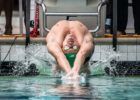
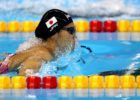
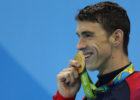
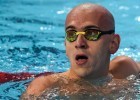
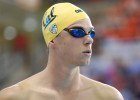
2016 JAPAN SWIM (JAPANESE OLYMPIC TRIALS)
- Monday, April 4th – Sunday, April 10th
- Tokyo Tatsumi International Swimming Center
- Prelims at 10am local/9pm EDT previous night; Finals at 6:30pm local/5:30am EDT
- Japanese Olympic Qualifying Times (Japanese)
- Psych Sheets (Japanese)
- Day 1 Finals Recap/Day 2 Finals Recap/Day 3 Finals Recap/Day 4 Finals Recap/Day 5 Prelims Recap
- Live Stream (Prelims)
- Results
MEN’S 200 BACKSTROKE – SEMI-FINAL
- Japanese National Record – 1:52.51, Ryosuke Irie (2009)
- JPN Olympic Standard – 1:56.79
A remarkable 4 Japanese swimmers fall within the world’s top 10 times in the men’s 200m backstroke event, so we’re in for a mega showdown as we progress from semi’s to finals.
2015-2016 LCM Men 200 BACK
LARKIN
1.53.17
| 2 | Ryan MURPHY | USA | 1.53.62 | 08/11 |
| 3 | Evgeny RYLOV | RUS | 1.53.97 | 08/11 |
| 4 | Jacob PEBLEY | USA | 1.54.77 | 07/01 |
| 5 | Jiayu XU | CHN | 1.54.79 | 04/08 |
| 6 | Tyler CLARY | USA | 1.55.33 | 07/01 |
| 7 | Irie RYOSUKE | JPN | 1.55.42 | 02/13 |
| 8 | Sean LEHANE | USA | 1.55.56 | 07/23 |
| 9 | Guangyuan LI | CHN | 1.55.89 | 08/11 |
| 10 | Radolslaw KAWECKI | POL | 1.55.98 | 05/21 |
The men are going to have to step it up in the next round, however, as the pack generally maintained its rhythm from this morning. 20-year-old Keita Sunama maintained his top seeded standing, following his morning swim of 1:57.12 up with a swifter mark of 1:56.43.
Although this is just semi’s and the mark doesn’t count toward Rio eligibility until the finals, Sunama’s season-best outing this morning cleared the JPN Olympic-qualifying standard of 1:56.79. He was the only swimmer of the field to have dipped under the threshold thus far.
In the sweet spot of the 2nd seed, Japanese National Record Holder and overall ‘Mr. Consistent’ in this event, Ryosuke Irie, clocked a time of 1:57.05 to modestly improve upon his earlier outing of 1:57.05. For Irie, he’s been as fast as 1:55.42 already this year, barring anything unusual, Irie is on schedule to drop more time in the final en route to surpassing the 1:56.79 JPN Olympic standard.
Top 8:
- Sunama, 1:56.43
- Iriea, 1:57.05
- Matsubara, 1:57.58
- Shriai, 1:58.05
- Kaneko, 1:58.69
- Watanabe, 1:59.67
- Nishimura, 2:00.33
- Hotta, 2:00.40
WOMEN’S 200 BREASTSTROKE – SEMI-FINAL
- Japanese National Record – 2:20.04, Rie Kaneto (2016)
- JPN Olympic Standard – 2:23.21
Japanese women represent 3 of the world’s top 10 times in this event as of today, led by the monster time of 2:20.04 27-year-old Rie Kaneto threw down at the Aquatic Super Series in Perth. That mark now stands as the Japanese National Record and has given Kaneto the confidence boost needed to hold off the likes of young guns such as 15-year-old Runa Imai.
2015-2016 LCM Women 200 BREAST
KANETO
2.19.65
| 2 | Yulia EFIMOVA | RUS | 2.21.41 | 03/04 |
| 3 | Taylor McKEOWN | AUS | 2.21.45 | 04/12 |
| 4 | Rikke PEDERSEN | DEN | 2.21.69 | 05/20 |
| 5 | Jinglin SHI | CHN | 2.22.28 | 08/11 |
| 6 | Molly RENSHAW | GBR | 2.22.33 | 08/10 |
| 7 | Chloe TUTTON | GBR | 2.22.34 | 04/13 |
| 8 | Kanako WATANABE | JPN | 2.22.41 | 09/03 |
| 9 | Jessica VALL MONTERO | ESP | 2:22.56 | 05/20 |
| 10 | Viktoria ZEYNEP GUNES | TUR | 2.22.87 | 11/07 |
And Kaneto continues to impress in Tokyo. After logging an opening prelim time of 2:24.05, she hacked off 3 seconds exactly to remain as the top seed after tonight’s semi-final. 2:21.05 was the mark the 27-year-old fired off tonight to now own the top 2 times in the world this season. As mentioned, since this is a semi and not final, although her time dipping beneath the JPN Olympic standard of 2:23.21 is a great indicator of where this athlete is at, it doesn’t render her a spot on the roster for Rio until she replicates the effort in a top 2 finish in finals.
Runner-up in the semi’s, Sakiko Shimizu, earned a time of 2:24.73 to improve upon her morning swim by just under 2 seconds. Shimizu missed out on making the Olympic team this year in the 200m IM, so she’s no doubt determined to make the most of her remaining opportunities to potentially earn a spot on the roster in this 200 breast event.
15-year-old Runa Imai won’t quit, however, claiming the 3rd seed in a solid mark of 2:24.85, less than a tenth behind Shimizu. The former National Record Holder and 2015 World Champion in the event, Kanako Watanabe, is also a threat not to be ignored, sitting comfortably as the 4th seed, laying in wait to pounce in the final.
Top 8:
- Kaneto, 2:21.05
- Shimizu, 2:24.73
- Imai, 2:24.85
- Watanabe, 2:25.27
- Suzuki, 2:25.72
- Ishida, 2:26.50
- Satou, 2:27.28
- Aoki, 2:27.67
MEN’S 200 IM
- Japanese National Record – 1:55.33, Kosuke Hagino (2014)
- JPN Olympic Standard – 1:58.02
An incredible 5 Japanese men are ranked within the world’s top 10 times so far this season, with only America’s 22-time Olympic medalist Michael Phelps having swum faster….until tonight’s finals session that is.
2015-2016 LCM Men 200 IM
PHELPS
1.54.66
| 2 | Kosuke HAGINO | JPN | 1.55.07 | 04/08 |
| 3 | Ryan LOCHTE | USA | 1.56.22 | 07/01 |
| 4 | Shun WANG | CHN | 1.57.05 | 08/11 |
| 5 | Thiago PEREIRA | BRA | 1.57.11 | 08/10 |
In a time just .18 of a second off of American Ryan Lochte’s gold medal-winning time from last year’s World Championships, 21-year-old Kosuke Hagino simply dropped the hammer in tonight’s 200m IM semi-final. Hagino stunned the field with a time of 1:55.98, his best of the season by almost 2 seconds and easily the number one time in the world right now.
Hagino produced a super solid 1:58.88 in prelims, but crushed that time in finals tonight. In comparing the splits between the two initial swims in Tokyo for the 2012 Olympic bronze medalist, it’s clear Hagino stepped hings up all around tonight, but especially maintained his higher tempo on the back half as opposed to his morning swim’s relative drop-off:
Hagino’s Prelim – 24.78/28.98/34.89/30.23 = 1:58.88
Hagino’s Semi – 24.43/28.58/34.06/28.91 = 1:55.98
The stud is already ranked as the world’s 4th-fastest performer of all time in the event with the 1:55.33 Japanese National Record he registered back in 2014. But, he has a chance to potentially bypass Hungary’s Laszlo Cseh on that list, needing to drop just .16 of a second to surpass Cseh’s 3rd-fastest result of all time, 1:55.18.
As for Hagino’s primary in-country rival, Daiya Seto, the time has now arrived for him to take things up to a new level in finals if he wants to survive the Rio-qualification test. Seto has been as fast as 1:57.72 so far this year, so the speed is certainly there. But he has two men named Fujimori, one Hiromasa and one Takeharu, hot on his heels, knocking down the door of the 2nd Olympic roster spot, assuming Hagino claims the 1st in tonight’s finals.
Seto, however, did have to leave some fuel in the tank for his 200m butterfly final later on this same session. Look for him to unleash his fury once he has this 200 IM as his solo finals session event.
Top 8:
- Hagino, 1:55.98
- Seto, 1:59.16
- H. Fujimori, 1:59.57
- T. Fujimori, 1:59.70
- Mizohata, 2:00.14
- Tutumi, 2:01.22
- Yamada, 2:01.50
- Takeuchi, 2:01.96
MEN’S 100 FREESTYLE – FINAL
- Japanese National Record – 48.41, Katsumi Nakamura (2015)
- JPN Olympic Standard – 48.16
- The Podium –
- Katsumi Nakamura, 48.25 (New National Record)
- Shinri Shioura, 48.35
- Kenji Kobase, 49.07
What a thriller! After an already history-making prelims where 12 Japanese men went sub-50 in the 100 free, tonight’s top 2 men both broke the existing Japanese National Record in the event.
The previous national record holder, Katsumi Nakamura, improved upon his swift 48.53 semi swim to register a monster 48.25 to represent the fastest Japanese man of all-time. That blows away his record by more than a tenth and further establishes Japan as a rising sprinting hotbed in its extreme infancy.
Right behind Nakamura was Shinri Shioura, who also dipped beneath the previous national record with a stellar mark of 48.35. As with his semi swim, Shioura took the race out faster than Nakamura, firing off an opening 50 of 23.05, but he wasn’t able to hang on, which rendered him in the silver medal spot.
As fast as these men were relative to sprinting history in Japan, neither of the top 2 men were able to score a mark beneath the Japanese Olympic-qualifying standard of 48.16 during the race. Pending a subjective decision by the Japanese Swimming Federation, the nation is without male 100m freestyle representation in Rio at this point.
WOMEN’S 100 FREESTYLE – FINAL
- Japanese National Record – 53.99, Rikako Ikee (2016)
- JPN Olympic Standard – 53.81
- The Podium –
- Miki Uchida, 53.88 (New National Record)
- Rikako Ikee, 54.06
- Yayoi Matsumoto, 54.43
We got treated to another outstanding sprint final as the top 2 Japanese women battled it out from the start. Japanese sprinting mainstay Miki Uchida took back her national record from 15-year-old Rikako Ikee tonight, becoming just the 2nd Japanese woman ever to clock a sub-54-second time.
53.88 is what Uchida churned out for the gold tonight, splitting 26.09/27.79. The mark puts Uchida just outside the world’s top 10 in the event this season.
Right behind was teenage phenom and former National Record Holder Ikee, who touched in 54.06 for silver, just .07 of a second off of her lifetime best of 53.99 from earlier this year. Ikee’s splits included 26.48/27.58 to score the runner-up spot tonight, taking her 3rd top-2 finish after having won the women’s 100m butterfly and 200m freestyle eventsearlier in the meet
As with the men, however, as fast as these females were, neither was able to clock a mark at or below the Japanese-dictated Olympic-qualifying standard of 53.81.
MEN’S 200 BUTTERFLY – FINAL
- Japanese National Record – 1:52.97, Takeshi Matsuda (2008)
- JPN Olympic Standard – 1:55.39
- The Podium –
- Daiya Seto, 1:54.14
- Masato Sakai, 1:54.21
- Nao Horomura, 1:55.98
Good news! This time, the top 2 finishers in an event both score times beneath the Japanese Olympic-qualifying standard. Daiya Seto, on a tough double after his 200m IM battle with Hagino earlier, soared to the top of the 200m butterfly podium tonight in a time of 1:54.14.
That time ranks as the number one performance in the world this season and makes it 2 individual events in Rio (so far) for Seto. He earlier qualified in the 400m IM. In that event, even though he finished 2nd to Hagino without a JPN Olympic standard, the JSF deemed his World Championship title worthy of securing a Rio roster spot in the race.
2015-2016 LCM Men 200 FLY
CSEH
1.52.91
| 2 | Michael PHELPS | USA | 1.53.36 | 08/09 |
| 3 | Masato SAKAI | JPN | 1.53.40 | 08/09 |
| 4 | Tamas KENDERESEI | HUN | 1.53.62 | 08/09 |
| 5 | Chad LE CLOS | RSA | 1.54.06 | 08/09 |
Runner-up tonight, Masato Sakai dropped a solid 3 tenths of a second off his semi swim of 1:54.57 to register a silver-winning time of 1:54.21 to also rack up an Olympic-qualifying mark. For 20-year-old Sakai, this marks his first Olympic appearance.
Of note, 31-year-old double Olympic bronze medalist Takeshi Matsuda finishes just off the podium with a 4th place time of 1:57.14.
MEN’S 200 BREASTSTROKE – FINAL
- Japanese National Record – 2:07.01*, Akihiro Yamaguchi (2012), *WR
- JPN Olympic Standard – 2:09.54
- The Podium –
- Yasuhiro Koseki, 2:08.14
- Ippei Watanabe, 2:09.45
- Hayato Watanabe, 2:09.91
For the 2nd event in a row, we saw the top 2 finishers fall under the stricter-than-FINA Olympic-qualifying times. Yasuhiro Koseki topped the field tonight in a time of 2:08.14 to overtake America’s Josh Prenot as the 2nd-fastest swimmer in the world this season.
2015-2016 LCM Men 200 BREAST
PRENOT
2.07.17
| 2 | Ippei WATANABE | JPN | 2.07.22*OR | 08/09 |
| 3 | Dmitriy BALANDIN | KAZ | 2.07.46 | 08/10 |
| 4 | Marco KOCH | GER | 2.07.69 | 01/30 |
| 5 | Anton CHUPKOV | RUS | 2.07.70 | 08/10 |
Koseki didn’t particularly evenly split the race, taking his 200m out an incredibly fast 1:00.94 and coming home in 1:07.02. But, it was enough to hold off a charging Ippei Watanabe who scored the silver tonight in 2:09.45.
Of note, 33-year-old 4-time individual Olympic gold medalist Kosuke Kitajima finished 5th in a mark of 2:09.96. Earlier in the meet, Kitajima finished 2nd in the 100m breaststroke, but was only able to dip beneath that event’s Olympic-qualifying mark in the semi’s. The Japanese Swimming Federation would need to impose a subjective decision in order for Kitajima to make his historic 5th Olympic Games.
In This Story
- Daiya Seto
Daiya Seto
- Ippei Watanabe
Ippei Watanabe
- Kanako Watanabe
Kanako Watanabe
- Kosuke Hagino
Kosuke Hagino
- Rikako Ikee
Rikako Ikee
- Runa Imai
Runa Imai
- Ryosuke Irie
Ryosuke Irie
- Yasuhiro Koseki
Yasuhiro Koseki

Wouldn’t kitajima be in the medley relay?
Above you have the 200 Women’s breaststroke time listed as 2:10, ought to be 2:20, yes?
Yes, 2:20.04, nice catch 🙂
Smart race management by Seto. Expect him to finish a strong 2nd to Hagino tonight. It was less than an hour between races because I was awake watching them. He would have potentially missed qualification in the 200fly if he had pushed that 200IM harder than necessary. Now he can drop the hammer tonight. Makes sense Kitajima would retire now.
Rafael, yes. Kitajima has announced his retirement.
Is he the greatest breaststroker of all-time?
I think so.
His battles with Hansen were amazing.
You mean he’s going to retire after or before Rio? He did qualify, after all.
Kitajima couldn’t get under the QT in the 100 breast final, so no, he didn’t qualify.
Seems Kitajima announced his retirement.. can anyone confirm?
And in the “what’s wrong category”, sorry if I’ve missed news or explanations by other swim fans in the last few days, what happens to Akihiro Yamaguchi?
Does he only remember he has broken the 200 breast world record in 2.07.01 in September 2012?
His top level has lasted only 2 months in August and September 2012.
It’s worse and worse since then.
2011. 2.11
2012. 2.07.01
2013. 2.09 something
2014 and 2015. 2.10 something
And yesterday he did not even qualify for semifinals at Japan nationals, swimming a disastrous 2.13.11.
Explanations?
He has been injured since 2012?
Doping in 2012?
Burnout?
He swam only in 49-meter pools in August and September 2012?
https://www.youtube.com/watch?v=bF9XNk7iARk
Seems he caught the same thing Ye Shiwen did 😉
Funny how it’s only happening to some Asians.
It’s truly even worse than Shiwen.
Shiwen had two tremendous swims in London, and also multiple very good swims like both IM’s at 2014 Asian Games and her 2011 World Title. Also she was 4:31 and 4:30 in ’13 and ’14 respectively at Chinese Trials.
Yamaguchi on the other hand has had one tremendous swim and maybe one of two high-end world class, but nothing at the medal-competitive level and only a few swims in the past 4 years that would even make semifinals. Truly a question of the ages.
Breaststroke records is frequently populated by “one hit wonder”.
Remember Rebecca Brown?
yah, I thought so.
As the stroke which depends the most on technique, changing body shape etc just tiny bit affected the performances the most compared to any other stroke.
There’s no mystery. Yamaguchi’s struggles with confidence, pressure, and losing his stroke are well documented in Japan:
http://www.japantimes.co.jp/sports/2013/05/30/more-sports/swimming/swimmers-hagino-yamaguchi-draw-positives-from-below-par-performances/#.VwfagxMrJmB
http://www.japantimes.co.jp/sports/2014/06/23/more-sports/swimming/irie-rediscovers-mojo-difficult-year-pool/#.VwfaiBMrJmB
What’s wrong with Kanako Watanabe? Did she not taper for this meet at all?
Oh wait I realized she automatically qualified as world champion, but that does explain her subpar IM showing?
She had a fast 100 brst but has had problems taking it out fast enough in the 2brst and 2im so far this meet
she might make up for it in 2brst but wasnt able to come back fast enought to make up for slow start in 2im
Probably not, she was guaranteed a spot in the 200 breast last year after winning in Kazan.
Koseki 2:08.14, I. Watanabe 2:09.45, H. Watanabe 2:09.91
Does this mean that I. Watanabe didnt qualify for Rio? Pretty disappointing swim for him, i am surprised that still no one got close to Koch’s time from January …
Kitajima barely sub 2:10, maybe he will be allowed to swim the 100 breast in Rio?